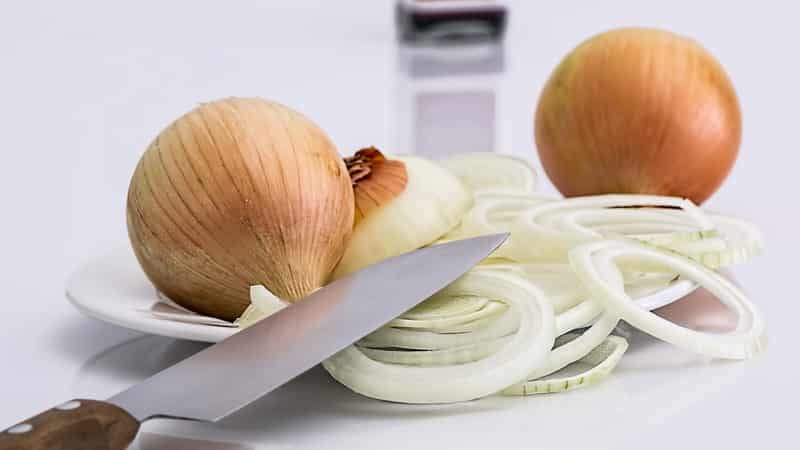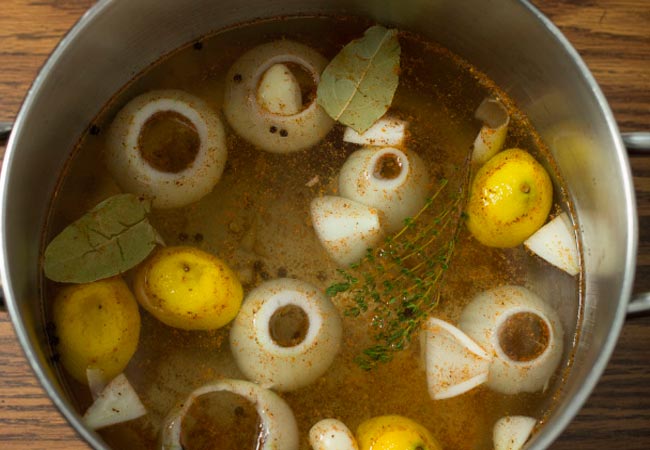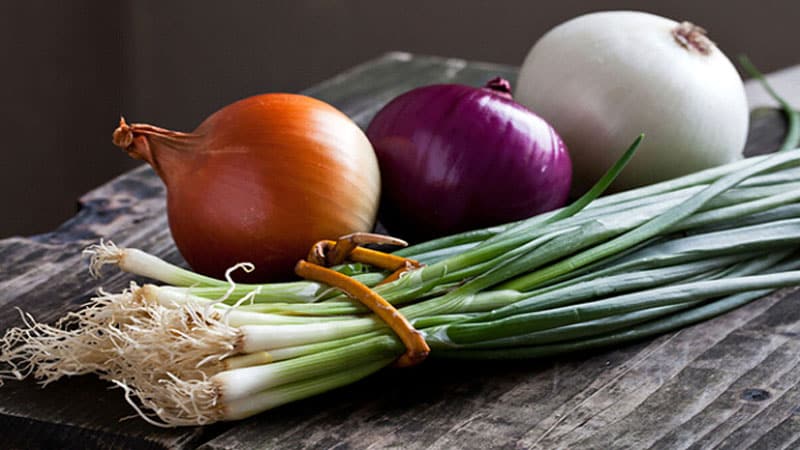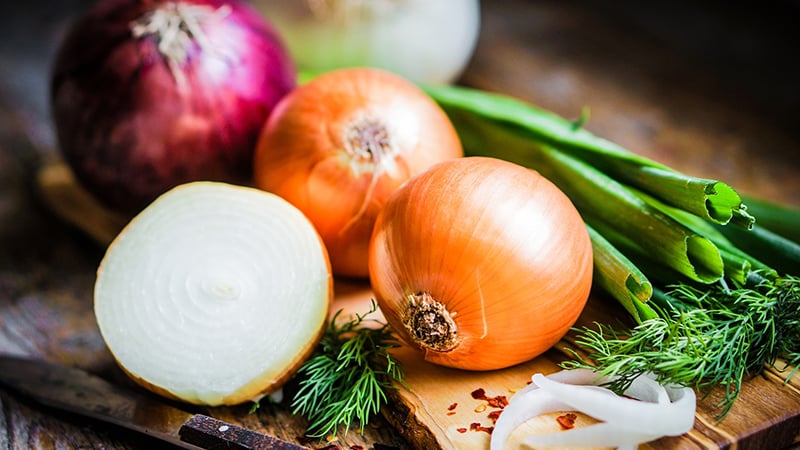Is it possible to eat onions while breastfeeding?
“Onion of seven ailments” - there is a popular wisdom. But is this true for a nursing mother? We will talk about the beneficial properties, myths and real benefits of this vegetable in the article, based on scientific research, reviews of pediatricians and neonatologists.
We will talk about how much and in what form onions can be consumed, as well as the methods and time limits for introducing them into the diet of a nursing mother.
Useful properties of onions
Thanks to its rich composition, this vegetable acts as:
- a natural immunomodulator and immunostimulant - vitamins E, B, C help improve immunity, mobilize defense mechanisms;
- natural anti-flu remedy - phytoncides resist infection and protect against the effects of harmful microbes;
- excellent antioxidant - flavonoids (quercetin) and ascorbic acid protect cells from damage by free radicals;
- mild diuretic due to irritants and large amounts of mineral salts.
In addition, the vegetable normalizes water-salt metabolism and has a beneficial effect on a healthy digestive system.
How does onion affect during lactation?
Immunologists believe that onions are useful for a woman’s body, exhausted by pregnancy and childbirth. But the main principle for a nursing mother is caution and careful introduction of new products into her menu. Any food affects the baby through breast milk.
How does this garden plant affect the “food chain” of mother and child?

On the mother
The beneficial chemical composition of onions serves as a kind of shield against infections and viruses, and also supports a weakened body during the postpartum period. Bioflavonoids and fiber contained in the onion have a positive effect on intestinal motility, normalize digestive processes and remove toxins from the body.
Chlorophyll, present in the feathers of green onions, affects the composition of the blood and the condition of blood vessels (prevents their fragility, strengthens the walls). The vitamin and mineral composition has a beneficial effect on the condition of the skin, hair and nails.
Per child
If neither parent has a food allergy, the likelihood of negative reactions in the infant is minimal. There is a mild laxative effect of onions. It is recommended if the child has frequent constipation and problems with bowel movements.
For milk
Many mothers wonder whether the bitterness of a vegetable affects the taste of milk? Pediatricians assure that moderate intake will not affect the taste of milk. Nature has made sure that the baby’s digestive system gradually adapts to new foods.
According to statistics, only 3-5% of babies can refuse breastfeeding due to taste “predilections”. In addition, the taste and quality of breast milk are largely affected by a woman’s hormonal changes, her lifestyle, inflammatory processes, and physical activity.
Those mothers who safely consumed it in any form during pregnancy should definitely not be afraid to eat onions. The baby will absorb milk without problems, since these nutrients have already been delivered to him through the bloodstream, and he is accustomed to this diet.
Can a nursing mother eat onions?
If there is no individual intolerance, then adding it to dishes is not only possible, but also necessary in order to diversify your diet and replenish vitamin deficiency.
It is worth paying attention to some nuances of consuming this healthy vegetable.
In any form

During long-term heat treatment - frying, boiling - onions lose most of their beneficial qualities.
When boiled, it is used as a spice to enhance the taste of first or second courses - soups, stews, casseroles and omelettes.
It is better not to overuse the vegetable when fried; the concentration of fat increases, carcinogens are released, and the onion itself loses its value.
The safest method is considered to be baking in the oven or cooking dishes with onions in a slow cooker.
Which to choose
Nutritionists and pediatricians emphasize that it is better to eat green onions during lactation. It is the green feathers that contain more potassium, magnesium and vitamins compared to the onion head.
Red varieties (Yalta, Red Baron, Retro) are sweeter than whites (Nevada, Sterling). White onions, for example, Rostovsky, Pogarsky, have a hot and pungent taste; it is advisable to limit their use.
Are there any alternative products that can replace it?
Young garlic can replace onions - as a bactericidal property and a natural antiseptic.
Basil seasoning will add piquancy to soups and salads. Fresh basil will help with anemia, fatigue and stress.
Parsley will replace carrots, which are not recommended to be consumed in the first stages of feeding: they are equal in vitamin A content. In addition, parsley saturates the body with calcium, which is beneficial for the growth of baby’s bones.
Dill greens are an excellent alternative to onion feathers. A spicy, aromatic addition will decorate any dish. Moreover, dill can be included in the diet already for 2-3 weeks of a child’s life. Dill water infused with seeds is useful for colic in a child, and the greens are important for the visual organs of both mother and baby.
Consumption of onions depending on the feeding period

When breastfeeding, the product is not administered immediately and in small quantities. Whether you can eat onions or not depends on the age of the baby and his well-being.
Important. To prevent viral infections, especially in spring and autumn, it is recommended to “breathe” the onion - chop it finely, put it on a napkin and leave it in the room for a few minutes to disinfect the air in the room.
In the first month
Pediatricians warn: for 3-4 weeks after birth, the mother’s diet should be gentle - nutritious and affordable, so as not to overload the digestive system of the mother and child.
As a rule, during this adaptation period, disturbances in the functioning of the intestines in both are considered natural. It is better to abstain from fresh vegetables (including onions) and fruits. The diet should contain only neutral foods - boiled and baked vegetables, cereals, kefir, light soups.
In the second month
Gradually, the baby’s digestive system stabilizes its functioning. In the second month you can try adding in stews small portions of onions (no more than 10-20 g for testing). It is not worth using fresh for food yet, especially if the baby still has flatulence and colic.
In the third month
During the third month of a child's life, it is recommended that onions are still subjected to heat treatment. You can simplify the procedure - before use, it should be finely chopped and doused with boiling water.You need to start with a minimum portion - no more than 10 g per day. It is better to consume in the first half of the day in order to notice possible unwanted reactions (diarrhea, allergic rashes) in time.
In the fourth month
In the fourth month of life, you can gradually introduce raw onions and green feathers into salads and cold dishes. The main thing is to observe the child and note how he tolerates the new product.
If no problems arise, then the desired vegetable can be safely included in the mother’s main diet in any form.
Rules for introducing onions into the diet of a nursing mother

To reduce the risk of negative reactions, a nursing mother should learn a few simple rules for eating green and onions. First of all, this is the dosage.
How often to use and in what form
After 2-3 weeks, onions can be added to soups and stews. It is the heat treatment (stewing, cooking) that is important, during which most of the allergens are neutralized.
You can try introducing fresh vegetables into the diet 3.5-4 months after birth; green feathers can be tried a month earlier.
A test dose of any product is important so that, if necessary, you can “calculate” it and exclude it from the diet:
- in the first half of the day, eat 10-15 g of onion to try (you can season a salad or soup with it);
- Observe the baby for 12-24 hours;
- if the result is positive, the single dosage is gradually increased to the daily norm;
- in case of intolerance (colic, poor sleep, change in stool), a repeat test can be performed after 3-4 weeks.
If you notice signs of an allergy (sneezing, spontaneous watery eyes, spots on the skin, hives, rashes on the body), consult a doctor immediately. Self-medication dangerous to the child's life.
Recipes with onions for nursing women
The most optimal cooking method is baking meat and vegetables, stew with the addition of finely chopped herbs and onions.
Salads with fresh vegetables (cabbage, cucumber), meat stews, mashed potatoes and any side dish can be lightly chopped with finely chopped green onions. Chopped herbs are used to season first courses - it is bright, piquant and healthy for a young mother.
In folk medicine there are many useful cough syrup recipes based on onion decoction. Most effective suitable for nursing mothers women at any time:
- Peel a medium-sized onion, finely chop it, place in a small saucepan with a lid.
- Add 250 g of water and 150 g of sugar to the container.
- Cook the syrup for 15 minutes over low heat (simmer).
- Method of administration: three times a day before meals.
Dosage
Pediatricians recommend not exceeding the daily norm - 60-70 g of onions per day (about one small “turnip”).
Green onions can be used up to 60 g per day - 2 tbsp. l.
Note. The above are approximate upper limits - each mother must independently learn to control and identify (listen to the baby’s body) individual norms for introducing a particular product.
Cooking methods
The boiled onion itself does not cause much appetite, so it can only be boiled in soup (cut the head in half) and then removed. This way, the vegetable broth will become more healthy and rich.
When breastfeeding, it is advisable to add onions to the diet in stewed or baked form. This method is convenient because the nutrients are preserved as much as possible and the appearance remains appetizing.
Contraindications and possible consequences of eating onions
Vegetables, both fresh and processed, have no direct contraindications. But neonatologists warn - overuse Any product, even the healthiest one, can cause a negative reaction and harm the baby’s still fragile digestive system.
Can onions harm the baby and mother?
Pickled onions and mixed vegetable salads with marinade are taboo for a nursing mother (herbs and spices, vinegar can cause allergies through breast milk). For hypertensive patients and women suffering from kidney and liver diseases, such dishes are contraindicated - fluid is retained, blood pressure increases, and pyelonephritis may worsen.
Onions have a strong irritant effect, stimulate the mucous membrane of the stomach and intestines - the stomach secretes a large amount of gastric juice. If you have existing stomach pathologies (high acidity, ulcers, gastritis), it can cause irritation and heartburn.
Can it cause allergies or colic in a baby?
Serious problems can be caused by soda-based okroshka, cold soups and salads with the addition of fresh onions: such a “cocktail” is fraught with “protest” in the baby’s intestines.
If both mother and baby are prone to intestinal problems (colic, bloating, gas accumulation, diarrhea), the consumption of fresh vegetables is limited to a minimum.
Attention! There is an opinion that for a cold A nursing mother needs to put onion juice in her nose. We strongly DO NOT recommend practicing this method - it is dangerous! Irritating substances cause burns to the nasal mucosa and can provoke an allergic reaction (swelling of the respiratory tract, congestion, suffocation).
Advice from pediatricians
Pediatric gastroenterologists assure that acetone syndromes, allergic dermatitis and other somatic pathologies occur in children in early childhood as a result of intolerance to any new products. Therefore, it is recommended to introduce vegetables, herbs, and fruits into the menu during breastfeeding only under the supervision of a doctor who knows the developmental characteristics of the baby and the concomitant diseases of the parents.
Pediatricians believe that “pseudo-allergy” quite often accompanies infants when they are introduced to new foods, even through breast milk. Bloating and diarrhea can be caused by lactase deficiency - a lack of the enzyme that breaks down lactose. Up to six months, the baby may experience intestinal disorders and rashes. This is a signal that the body does not accept new food and eliminates it in this way. In this case, seek advice from a specialist.
Neonatologists advise “accustoming” the baby to new products gradually, according to the norms and dosage of administration, carefully monitoring the reaction.
Conclusion
In conclusion, I would like to note that the natural period of breastfeeding should not be accompanied by dietary restrictions and a poor diet. You can and should eat green onions and onions. The main thing is the gradual introduction of vegetables and a reasonable approach. It is important to clarify anything that raises doubts or concerns with your pediatrician.